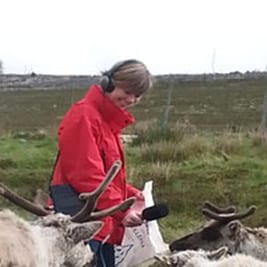
Last time we talked about virtual reality and journalism, but today we are going to talk about radio documentaries. Is there a future for radio? Can it be a good medium to narrate big human stories, such as the so called “migrant crisis”?
We went to Deborah Dudgeon, documentary maker at Whistledown and author of several series for the BBC, to get some answers and also some tips.
Radio documentaries: are they still a feasible way of storytelling? What are the advantages of this kind of medium?
I think we are experiencing a golden age in radio right now. The rise of podcasts has only enhanced the medium as it means good audio is reaching a wider audience, and it has given us all a good shake up, to examine the way we do things, and think about how our stories can stand out. There will always be a place for the crafted radio documentary, as stories are told in more ways than words, as any good drama demonstrates. The sounds in the background, the change in atmosphere, and witnessing events unfolding are the crucial elements of many documentaries.
What are the most important things you should include while working on a radio documentary?
It's always about good storytelling. First and foremost, you need good contributors: people you want to listen to and who have something interesting to say. And you need to think about where you record them. Do we need to hear them in their own environment, or ask them to take us to the place they're talking about, or is what they say so moving or momentous that we need complete silence in the background? How will you change scenes? Should the listener come with you as you do that? Or do you want to create drama with a complete contrast from one environment to another?
And remember to record loads and loads of background sounds. Stop and listen to where you are. Think about how much that background sound evokes the atmosphere and record it so the listener can join in.
What are instead the things you should avoid?
Since radio is all about engaging people's brains to create a scene in their head, it's quite boring to hear people talk about things happening, without actually hearing them happening. Of course, that's fine in some circumstances - you're often hearing about something happening in retrospect. But if someone is going to tell you how to cook an egg, let's hear them actually cooking it and describing what they're doing, rather than just reading out instructions.
Has the way of building a radio documentary changed over the years? If so which is the biggest change and what are the next steps?
I think there has always been great creativity in the radio industry and you can listen to an old documentary and be just as hooked today as when it was first broadcast. Because at its heart, it's all about really good storytelling. Perhaps people can now be more experimental with structure - not necessarily telling a story in a linear way. But I think a major influence on many producers has been "Serial", and some other American podcasts that have let the audience in on the process of making the piece. It's a nice way to be more intimate with the audience, and more honest about what has and hasn't worked, but we have to be careful it doesn't become a cliche. I wonder whether the next steps might involve the audience even more, in terms of collaboration - it's so much easier to make good quality recordings, even on smart phones, that more and more listeners can become citizen journalists.
As one of the topics of the Prix this year is migration, what kind of approach would be the best one when working on such a story?
I'm not sure that there is any right way to approach any topic. There will be many different approaches, and journalistic styles. And this variety will allow us more opportunities to get the stories heard. Again, it all comes down to good story-telling and the importance of giving people a voice. But I think there are particular challenges, in such a situation of mass suffering, to ensure we hold on to firm journalistic principles and keep checking facts and asking challenging questions of all sides.
Finally, tell us about one of your projects which you consider the most innovative.
One of the programmes of which I'm most proud wasn't technically innovative at all. But I think its sheer basic production values was one of its strengths as we stripped it bare and relied purely on the power of the narrative to create the drama. It involved men who had committed domestic violence telling us about their experiences in their own words. The strength was in the silences and brilliant interviewing from my presenter, Victoria Derbyshire. Very often in radio, less is more.
When we asked Dudgeon which was the best radio program on the migration crisis she had heard in the past year, she mentioned a series on the Italians of Lampedusa, which was aired on BBC Radio 4.
Stay tuned because next week we will talk to the author of this series, BBC journalist Emma Jane Kirby.



